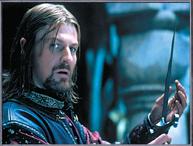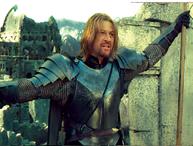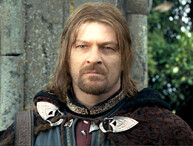Boromir, Bearer of Council (9R+31)
Back to Reflections Index |
Elendil, The Tall (9R+32) |
Boromir, Bearer of Council (9R+31) is a Gondor Companion from the Reflections set.
| ||||||||||||||||||||||||
| ||||||||||||||||||||||||
| ||||||||||||||||||||||||
| ||||||||||||||||||||||||
Strategy[edit]
Boromir, Bearer of Council is one of the original alternate Ring-bearers from Reflections, allowing you to replace Frodo with one of the other companions that might've borne the One Ring. Like most of these alternate ring-bearers, he's usually only used if you're going to have him bear the One Ring. This version of Boromir fits well in a Gondor-focused deck, in both theme and function, especially if that deck uses cards like Noble Leaders (7R112)
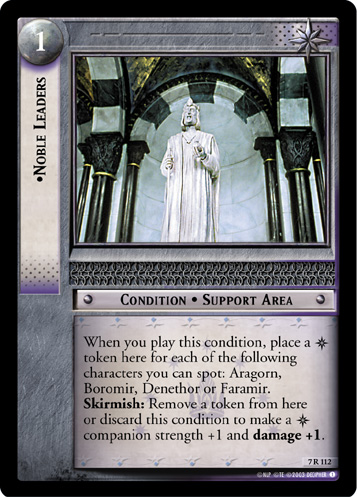 and Stewards’ Legacy (13U75)
and Stewards’ Legacy (13U75)
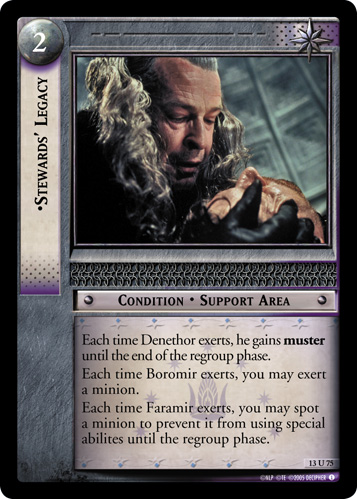 that benefit from spotting Boromir.
that benefit from spotting Boromir.
Bearer of Council has the significant advantage of 7 base strength. Unlike Frodo, he doesn't need a strength boost to avoid being overwhelmed by any but the strongest minions. He can even win an occasional skirmish, both with his higher base strength and access to cards that apply to Gondor or Man companions. This comes at a high cost: every time he skirmishes, you need to expend more than half his base capacity for burdens or wounds. You're trading Frodo's weakness to instant death for Boromir's lingering weakness to repeated skirmishes, and swarm decks or cards like Bill Ferny, Swarthy Sneering Fellow (2R75)
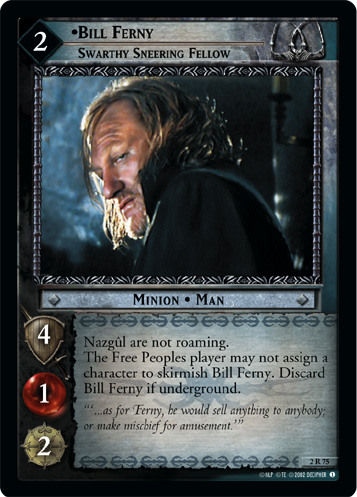 or Úlairë Nertëa, Dark Horseman (19P38)
or Úlairë Nertëa, Dark Horseman (19P38)
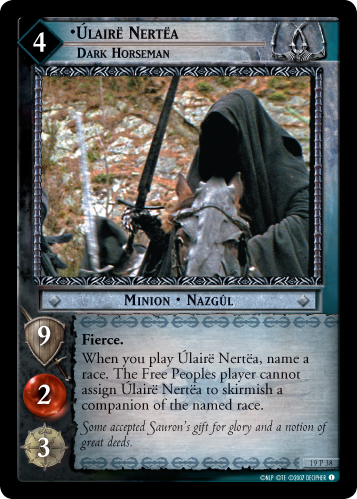 can often keep pushing him into skirmishes. This drawback can be mitigated by increasing his vitality, boosting his resistance, or via wound and burden removal. The One Ring, Answer To All Riddles (4R1)
can often keep pushing him into skirmishes. This drawback can be mitigated by increasing his vitality, boosting his resistance, or via wound and burden removal. The One Ring, Answer To All Riddles (4R1)
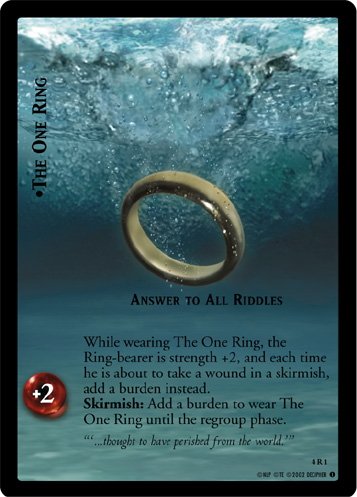 , The One Ring, The Ring of Doom (15R1)
, The One Ring, The Ring of Doom (15R1)
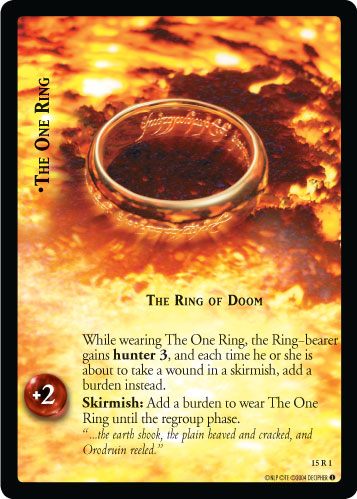 , or The One Ring, The Ring of Rings (11R1)
, or The One Ring, The Ring of Rings (11R1)
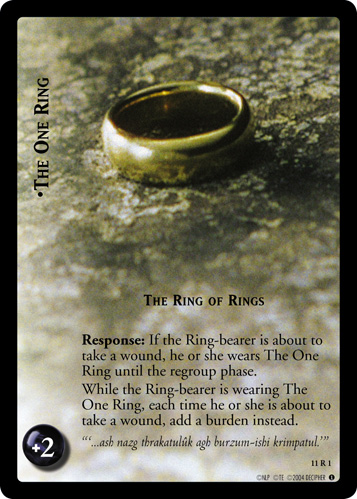 can help with his wound or burden pool. A
can help with his wound or burden pool. A Gondor artifact strategy, with cards like Scroll of Isildur (9R36)
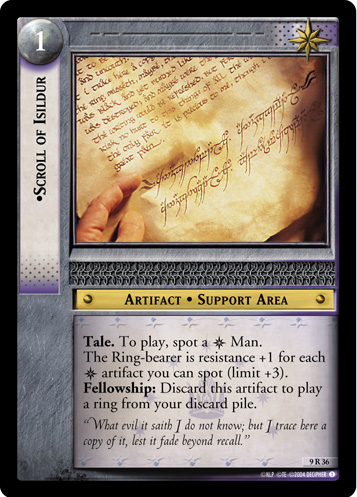 and Sapling of the White Tree (9R35)
and Sapling of the White Tree (9R35)
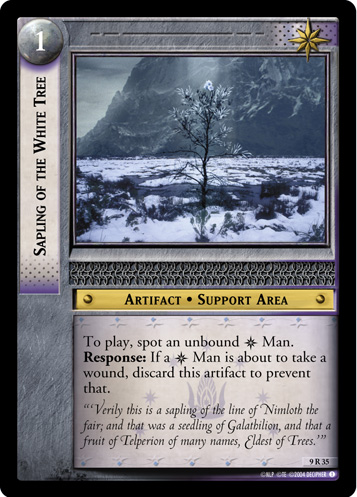 , can also help offset the cost of occasionally skirmishing with him. You can also supplement his vitality with Narsil, Blade of the Faithful (9R+34)
, can also help offset the cost of occasionally skirmishing with him. You can also supplement his vitality with Narsil, Blade of the Faithful (9R+34)
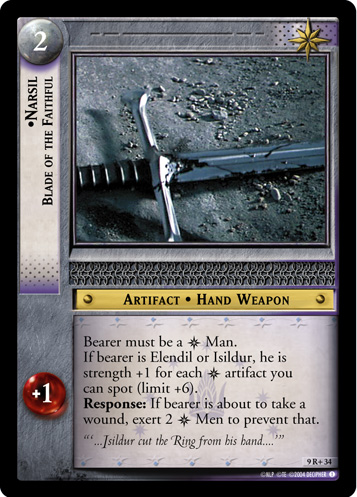 or The Saga of Elendil (1R114)
or The Saga of Elendil (1R114)
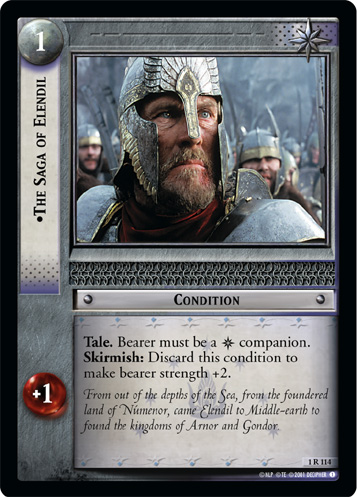 , although this can be risky: if one of these cards is removed when he has only one wound left, he'll die and you'll lose the game!
, although this can be risky: if one of these cards is removed when he has only one wound left, he'll die and you'll lose the game!
He's also immune to cards that target Hobbits or Shire companions. Most of these cards are not popular in formats that include Reflections, but it's also one less culture to spot, making you less vulnerable to cards like Gríma, Chief Counselor (5R51)
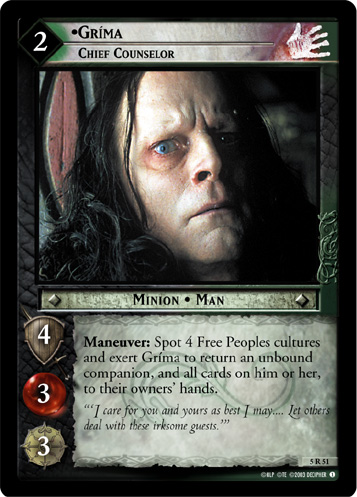 . Remember that if he is the ring-bearer, he is also Ring-bound, and immune to cards that target unbound companions. In particular, it's safer to stack conditions or possessions on him while he's the ring-bearer, without fear of Gríma, Wormtongue (4R154)
. Remember that if he is the ring-bearer, he is also Ring-bound, and immune to cards that target unbound companions. In particular, it's safer to stack conditions or possessions on him while he's the ring-bearer, without fear of Gríma, Wormtongue (4R154)
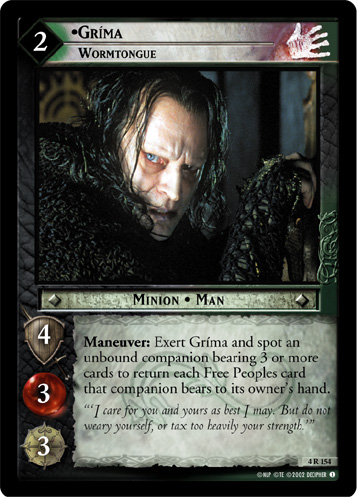 .
.
Boromir, Bearer of Council doesn't just compete with Frodo, however. He also competes with the other two Gondor alt ring-bearers: Isildur, Bearer of Heirlooms (9R+33)
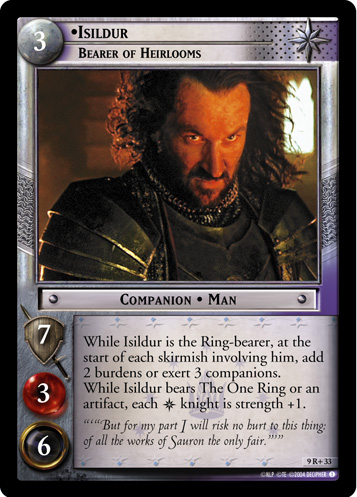 and, in formats that include Rise of Saruman, Faramir, Bearer of Quality (17R28)
and, in formats that include Rise of Saruman, Faramir, Bearer of Quality (17R28)
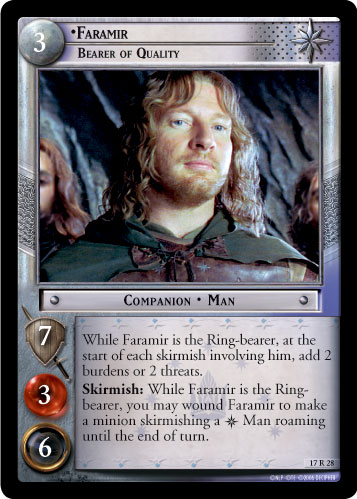 . Of the three
. Of the three Gondor ring-bearers, as he has the harshest penalty for getting into a skirmish. Boromir always ends up pressuring his own vitality and resistance if he ends up in his ring-bearer, while the other two can offload that risk to the other companions or the threat pool. If all you want is a
Gondor ring-bearer and none of their abilities are important to your deck, the skirmish penalty makes Boromir the riskiest choice of the three. Boromir's inherent ability to discard minions is strong and useful in every deck, but you're paying for it with significant risk.
Boromir's main advantage over the other Gondor ring-bearers is his name: you can spot Boromir for cards like Noble Leaders (7R112)
 and Stewards’ Legacy (13U75)
and Stewards’ Legacy (13U75)
 , both of which are often used as the core of a deck. While Faramir, Bearer of Quality can also be spotted by those cards, it's easier to fit a starting slate of Boromir, Bearer of Council and a cost-reducing Faramir than vice versa. Decks like Noble Leaders (7R112)
, both of which are often used as the core of a deck. While Faramir, Bearer of Quality can also be spotted by those cards, it's easier to fit a starting slate of Boromir, Bearer of Council and a cost-reducing Faramir than vice versa. Decks like Noble Leaders (7R112)
 decks or Token Tanks often start with Boromir, Bearer of Council, a discounted version of Faramir like Faramir, Captain of Gondor (4R116)
decks or Token Tanks often start with Boromir, Bearer of Council, a discounted version of Faramir like Faramir, Captain of Gondor (4R116)
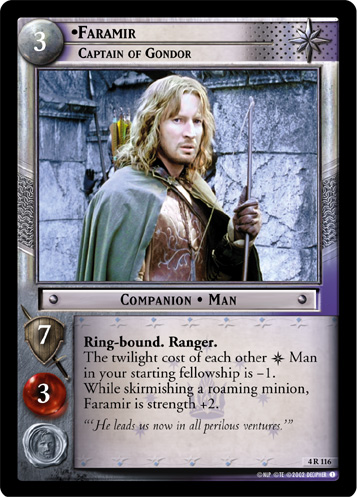 or Faramir, Captain of Ithilien (18R48)
or Faramir, Captain of Ithilien (18R48)
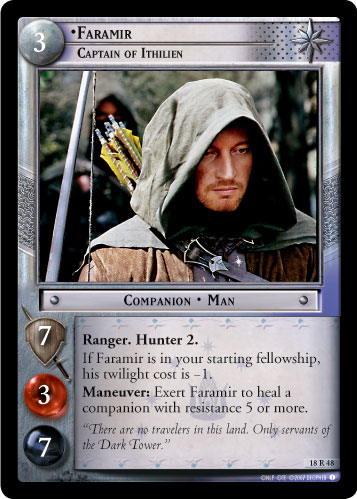 , and Denethor, Lord of Minas Tirith (10R28)
, and Denethor, Lord of Minas Tirith (10R28)
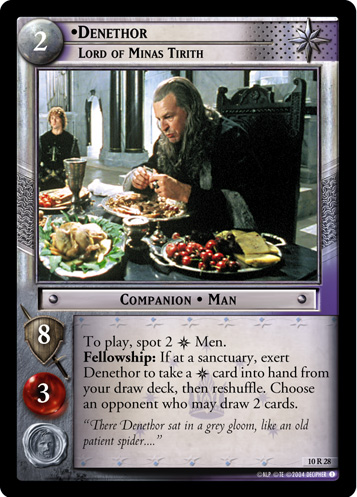 , with a plan to use Denethor to search your deck for several
, with a plan to use Denethor to search your deck for several Gondor cards at site 3. If you switch to Faramir, Prince of Ithilien (13C66)
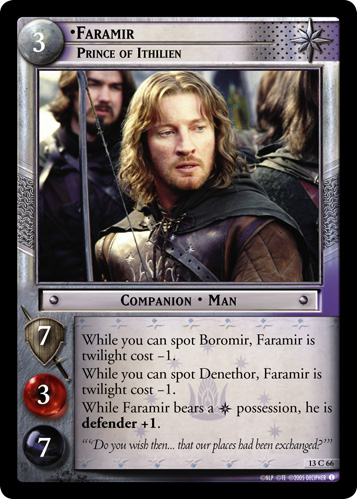 , you can also fit in Aragorn, Strider (11R54)
, you can also fit in Aragorn, Strider (11R54)
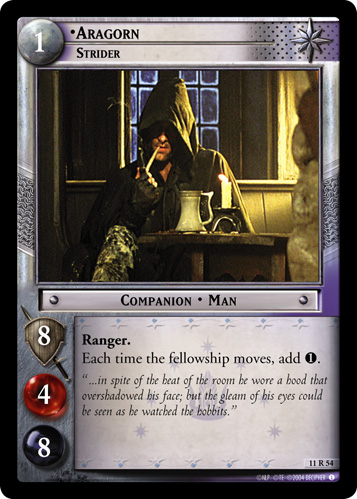 to start, although you may prefer to use Denethor to search for a stronger version of Aragorn like Aragorn, King in Exile (1P365)
to start, although you may prefer to use Denethor to search for a stronger version of Aragorn like Aragorn, King in Exile (1P365)
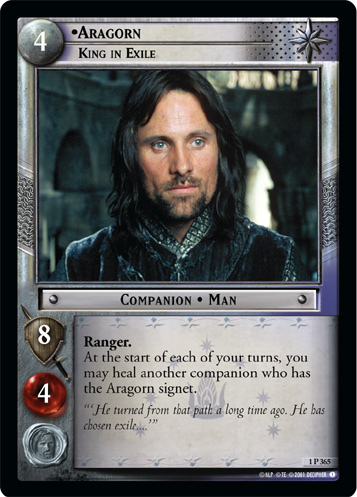 , Aragorn, Captain of Gondor (7C81)
, Aragorn, Captain of Gondor (7C81)
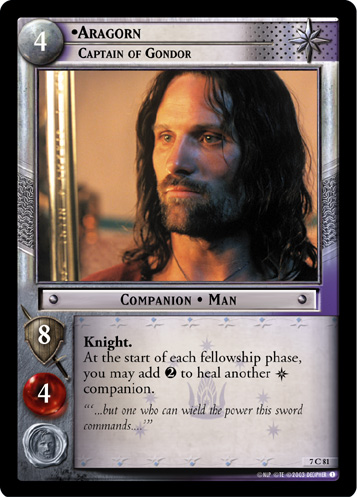 , or Aragorn, Thorongil (15R55)
, or Aragorn, Thorongil (15R55)
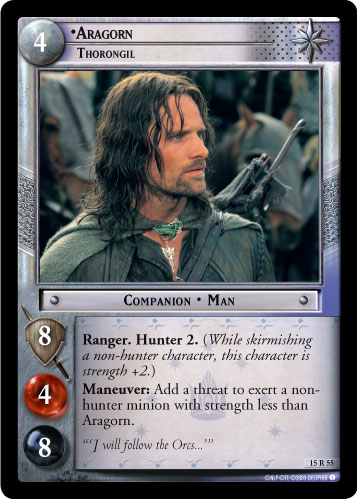 at site 3 instead.
at site 3 instead.
If you can afford the wounds or burdens, Boromir can take advantage of the numerous strength-boosting cards that apply to Gondor companions or men (e.g. Blade of Gondor (1R95)
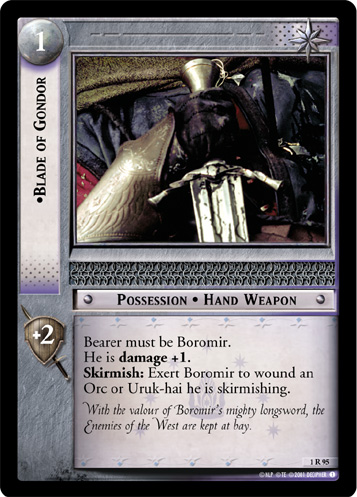 , Ithilien Blade (15C62)
, Ithilien Blade (15C62)
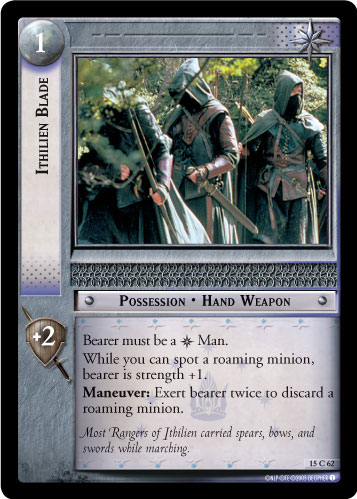 , or The Last Alliance of Elves and Men (1R49)
, or The Last Alliance of Elves and Men (1R49)
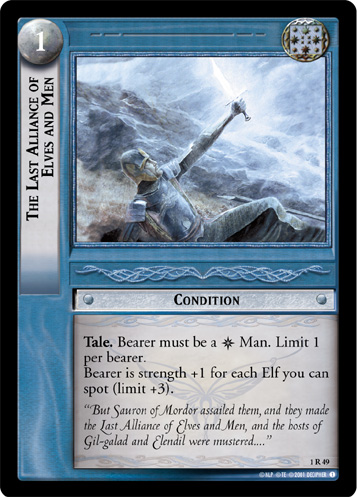 ) to win skirmishes and discard the minions he is skirmishing, regardless of their remaining vitality. This can come in very handy to prevent Shadow cards like Isengard Artisan (6C65)
) to win skirmishes and discard the minions he is skirmishing, regardless of their remaining vitality. This can come in very handy to prevent Shadow cards like Isengard Artisan (6C65)
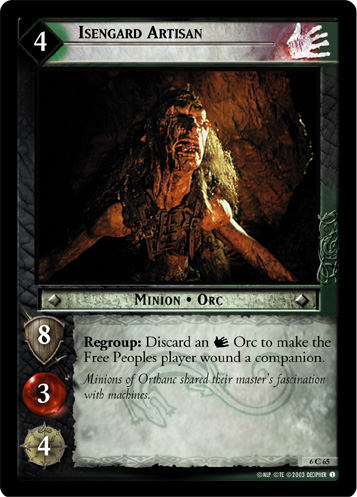 or Web (8C30)
or Web (8C30)
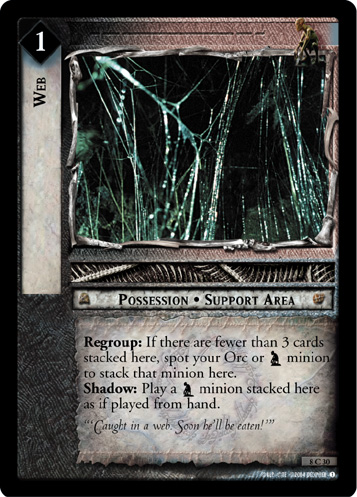 from using their Regroup abilities, or simply to remove minions to set up a double move. Alternately, you can simply keep Boromir away from skirmishes as best you can and use his vitality pool for exertions. Many
from using their Regroup abilities, or simply to remove minions to set up a double move. Alternately, you can simply keep Boromir away from skirmishes as best you can and use his vitality pool for exertions. Many Gondor turn exertions into something useful, including
archery (particularly Gondor Bowmen (3R41)
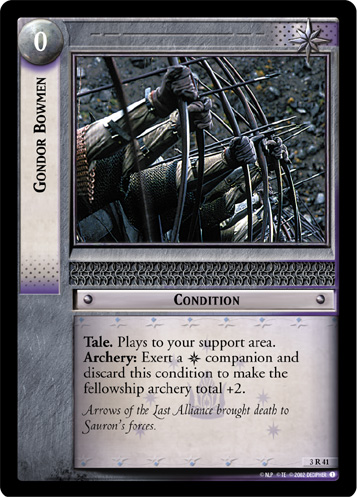 ), Fortifications (e.g. Stone Tower (5R39)
), Fortifications (e.g. Stone Tower (5R39)
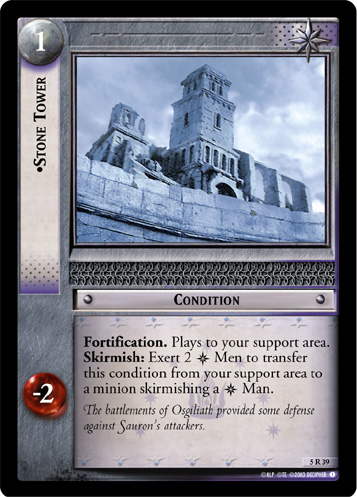 and Citadel of the Stars (5C32)
and Citadel of the Stars (5C32)
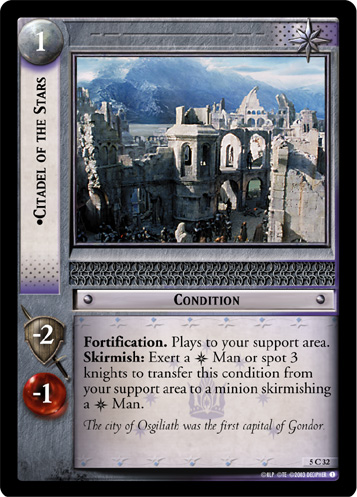 ), and roaming minion hate (e.g. Ranger’s Cloak (15C68)
), and roaming minion hate (e.g. Ranger’s Cloak (15C68)
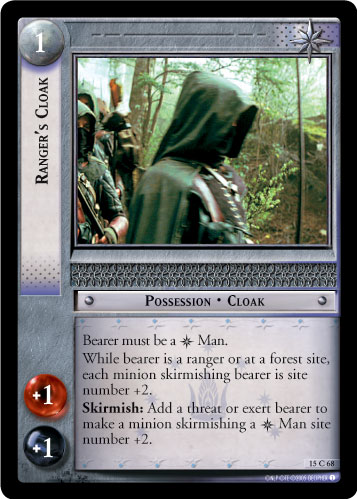 , Ithilien Blade, and Soldier's Cache (18U58)
, Ithilien Blade, and Soldier's Cache (18U58)
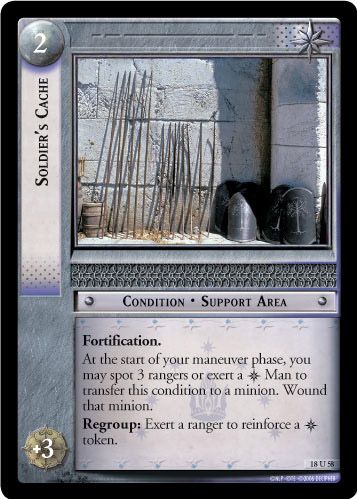 ). All of these strategies work very well with Stewards’ Legacy (13U75)
). All of these strategies work very well with Stewards’ Legacy (13U75)
 , as the extra exertions help make the minions more vulnerable to being wounded and killed.
, as the extra exertions help make the minions more vulnerable to being wounded and killed.
This version of Boromir is one of the few alternate ring-bearers that is actually worth playing as a regular companion, although he is not a popular choice. His statistics are only middling for his twilight cost, and a twilight cost of 3 is awkward to fit into a starting Fellowship. However, if you can boost his strength high enough that he wins skirmishes (generally using possessions, Noble Leaders (7R112)
 , The Last Alliance of Elves and Men (1R49)
, The Last Alliance of Elves and Men (1R49)
 , or Merry, Friend to Sam (1R302)
, or Merry, Friend to Sam (1R302)
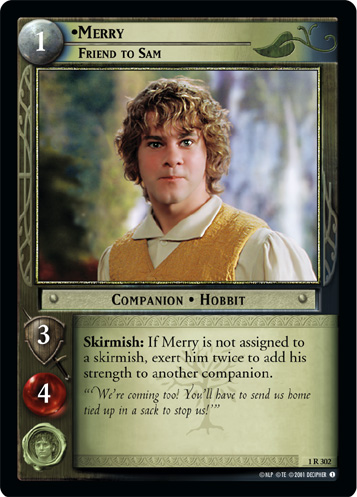 ), he can discard those minions for you, similar to the way he's used as ring-bearer. In decks that already have a ring-bearer, though, there's just no place for a ring-bearing man. He's bracketed on either side by stronger companions, like Faramir, Son of Denethor (4C117)
), he can discard those minions for you, similar to the way he's used as ring-bearer. In decks that already have a ring-bearer, though, there's just no place for a ring-bearing man. He's bracketed on either side by stronger companions, like Faramir, Son of Denethor (4C117)
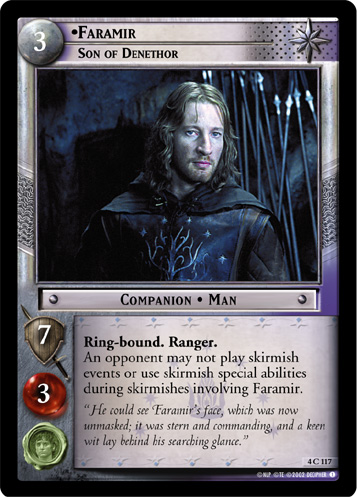 , Elendil, The Tall (9R+32)
, Elendil, The Tall (9R+32)
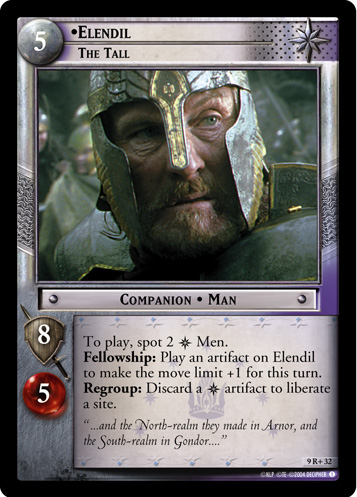 , or any version of Aragorn, and by cheaper utility companions like Dervorin (7U88)
, or any version of Aragorn, and by cheaper utility companions like Dervorin (7U88)
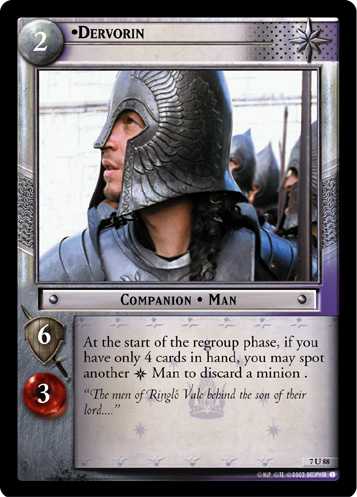 . He's also generally reliant on bearing cards to get his strength up, so he's often vulnerable to Gríma, Wormtongue (4R154)
. He's also generally reliant on bearing cards to get his strength up, so he's often vulnerable to Gríma, Wormtongue (4R154)
 .
.
Strengths and Weaknesses[edit]
Synergizes With...[edit]
- Conditions that spot Boromir in particular, especially Noble Leaders (7R112)
 and Stewards’ Legacy (13U75)
and Stewards’ Legacy (13U75)

- In conjunction with Stewards’ Legacy (13U75)
 , any card that exerts him to produce a useful effect, as long as that exertion isn't in the Fellowship or Regroup Phases. This includes
, any card that exerts him to produce a useful effect, as long as that exertion isn't in the Fellowship or Regroup Phases. This includes archery (e.g. Gondor Bowmen (3R41)
 and Bow of Minas Tirith (11U58)
and Bow of Minas Tirith (11U58)
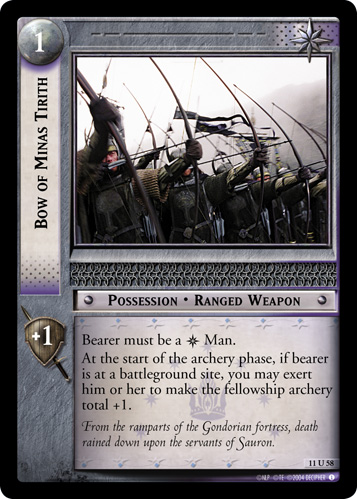 ), Fortifications (e.g. Stone Tower (5R39)
), Fortifications (e.g. Stone Tower (5R39)
 and Citadel of the Stars (5C32)
and Citadel of the Stars (5C32)
 ), and roaming minion hate (e.g. Ranger’s Cloak (15C68)
), and roaming minion hate (e.g. Ranger’s Cloak (15C68)
 , Ithilien Blade (15C62)
, Ithilien Blade (15C62)
 , and Soldier's Cache (18U58)
, and Soldier's Cache (18U58)
 ).
). Gondor companions that need to spot relatively many
Men, like Denethor, Lord of Minas Tirith (10R28)
 and Elendil, The Tall (9R+32)
and Elendil, The Tall (9R+32)

- Versions of the One Ring that help with his vitality or resistance, like The One Ring, Answer To All Riddles (4R1)
 , The One Ring, The Ring of Doom (15R1)
, The One Ring, The Ring of Doom (15R1)
 , or The One Ring, The Ring of Rings (11R1)
, or The One Ring, The Ring of Rings (11R1)

- The
Gondor artifact substrategy, with Scroll of Isildur (9R36)
 to boost his resistance and Sapling of the White Tree (9R35)
to boost his resistance and Sapling of the White Tree (9R35)
 to prevent wounds
to prevent wounds
Strong Versus...[edit]
- Shadow strategies that rely on overwhelming the ring-bearer in a single skirmish, especially in the early-game
- Shadow cards that spot
Shire companions or Hobbits, on the assumption that the ring-bearer is one
- Cards that spot many Free Peoples cultures, such as Gríma, Chief Counselor (5R51)

- Shadow minions or conditions that rely on minions surviving to the Regroup phase, as long as you can afford to skirmish with Boromir. This includes Web (8C30)
 and
and Isengard orcs like Isengard Artisan (6C65)

Weak Versus...[edit]
- Corruption. He's especially vulnerable to Thin and Stretched (1R279)
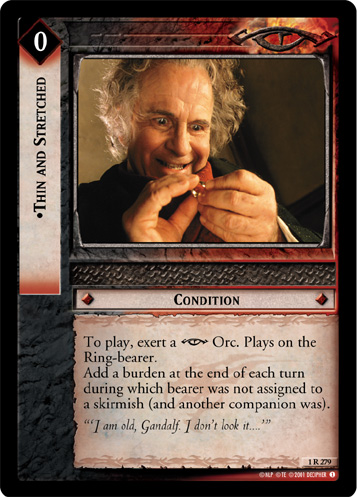 , or corruption bomb strategies that apply many burdens at once, such as Lost to the Goblins (1R189)
, or corruption bomb strategies that apply many burdens at once, such as Lost to the Goblins (1R189)
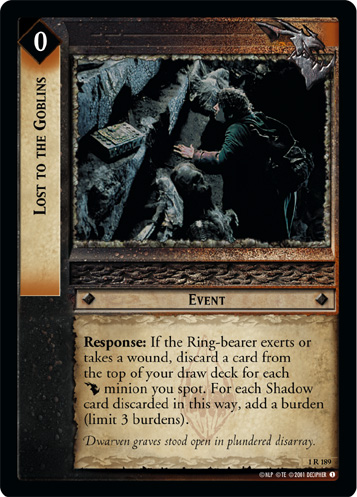
- Such a Little Thing (3R80)
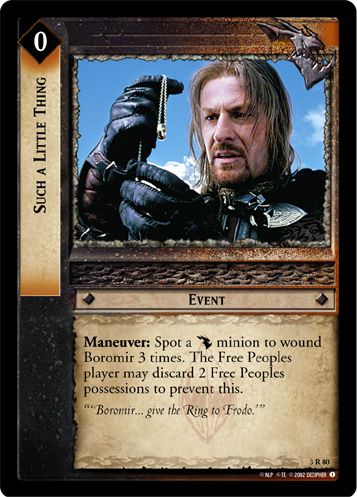
- Repeated skirmishes, particularly from minions that are difficult or impossible to assign to another companion, such as Bill Ferny, Swarthy Sneering Fellow (2R75)
 , Gollum, Mad Thing (10R21)
, Gollum, Mad Thing (10R21)
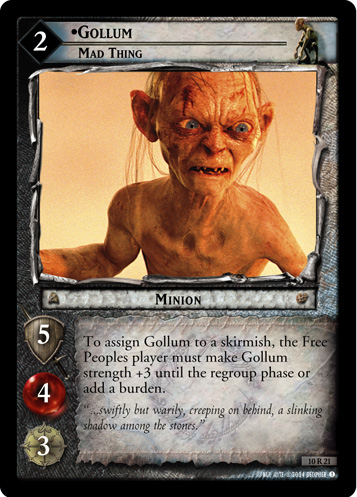 , and Úlairë Nertëa, Dark Horseman (19P38)
, and Úlairë Nertëa, Dark Horseman (19P38)

- Gollum, Hopeless (15R43)
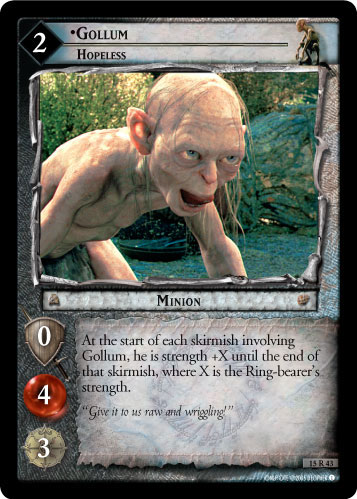 if you have strength-boosting cards stacked on him
if you have strength-boosting cards stacked on him
Rulings[edit]
- The player cannot elect to wound Boromir twice if Boromir cannot take wounds or cannot take more than one wound, such as when he is bearing Armor (1C92)
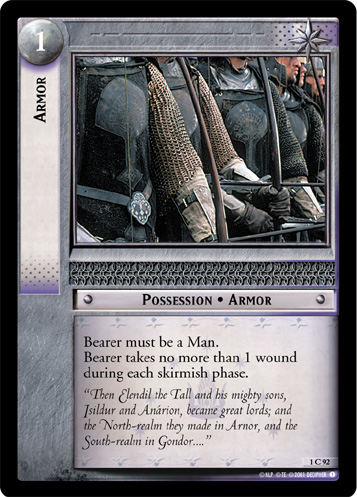 .
.
Alternate Personas[edit]
| Portrait | Name | Game Text |
|---|---|---|
Boromir, Lord of Gondor (1R96)
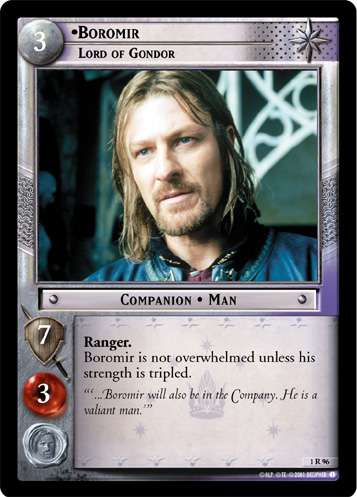
|
Ranger.
Boromir is not overwhelmed unless his strength is tripled. | |
Boromir, Son of Denethor (1U97)
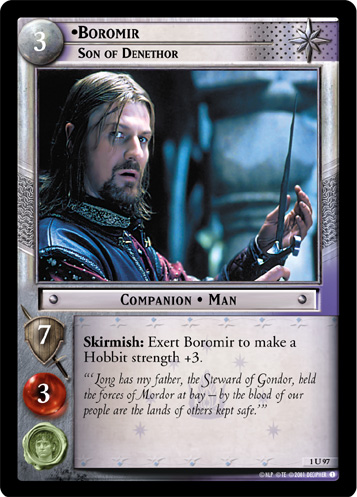
|
Skirmish: Exert Boromir to make a Hobbit strength +3. | |
Boromir, Defender of Minas Tirith (3P122)
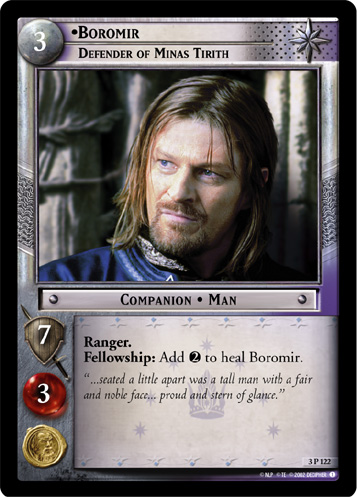
|
Ranger. | |
Boromir, Hero of Osgiliath (11R57)
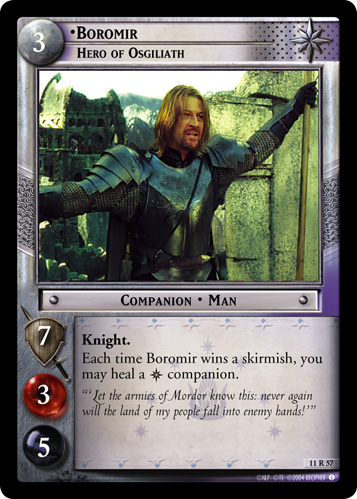
|
Knight. Each time Boromir wins a skirmish, you may heal a | |
Boromir, Defender of Minas Tirith (12U43)
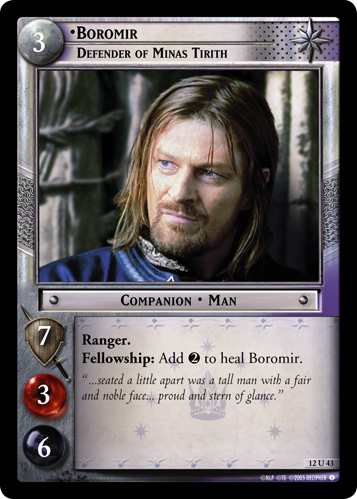
|
Ranger. | |
Boromir, Doomed Heir (13S62)
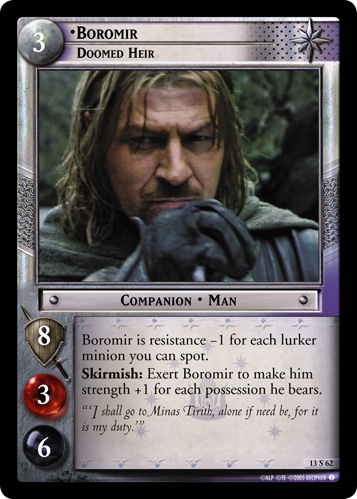
|
Boromir is resistance –1 for each lurker minion you can spot.
Skirmish: Exert Boromir to make him strength +1 for each possession he bears. | |
Boromir, Proud and Noble Man (18R40)
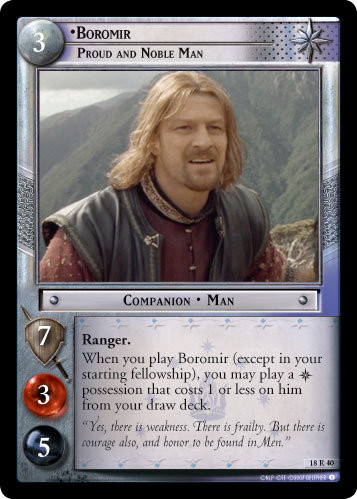
|
Ranger.
When you play Boromir (except in your starting fellowship), you may play a possession with a twilight cost of 1 or less on him from your draw deck. | |
Boromir, Destined Guide (19P13)
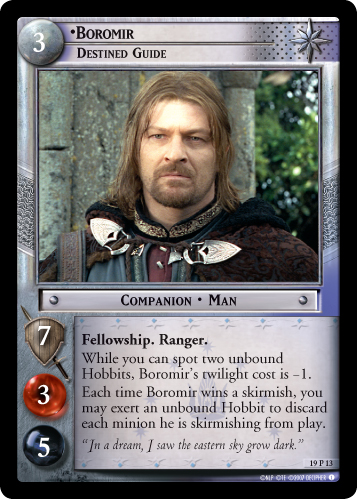
|
Fellowship. Ranger.
While you can spot two unbound Hobbits, Boromir’s twilight cost is –1. Each time Boromir wins a skirmish, you may exert an unbound Hobbit to discard each minion he is skirmishing from play. | |
Boromir, Steward's Heir (0P65)
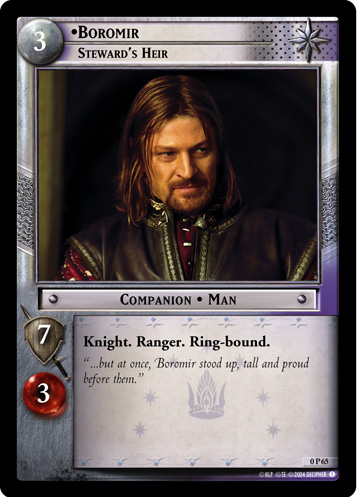
|
Knight. Ranger. Ring-bound. | |
Boromir, Redeemed (V1_20)
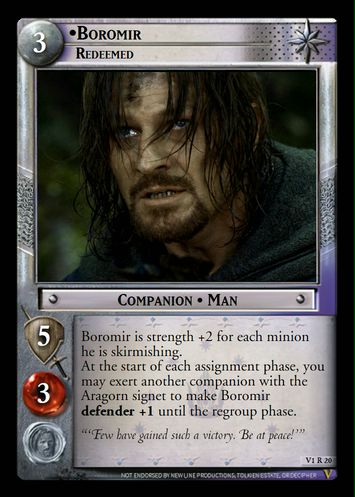
|
Boromir is strength +2 for each minion he is skirmishing.
At the start of each assignment phase, you may exert another companion with the Aragorn signet to make Boromir defender +1 until the regroup phase. |





